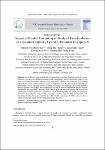Item Infomation
Full metadata record
| DC Field | Value | Language |
|---|---|---|
| dc.contributor.author | Nghiem Thi Minh, Hoa | - |
| dc.contributor.author | Dang The Hung, Luong Minh Tuan | - |
| dc.contributor.author | Duong Xuan, Nui | - |
| dc.contributor.author | Nguyen Duc Trung, Kien | - |
| dc.date.accessioned | 2020-06-18T03:09:01Z | - |
| dc.date.available | 2020-06-18T03:09:01Z | - |
| dc.date.issued | 2020 | - |
| dc.identifier.uri | https://dlib.phenikaa-uni.edu.vn/handle/PNK/396 | - |
| dc.description.abstract | In an arbitrary system subjected to a quench or an external field that varies the system parameters, the degrees of freedom increase double in comparison to that of an isolated system. In this study, we consider the quantum impurity system subjected to a quench, and measure the corresponding time-evolution of the spectral function, which is originated from the time-resolved photoemission spectroscopy. Due to the large number of degrees of freedom, the expression of the time-dependent spectral function is twice much more complicated than that of the time-independent spectral function, and therefore the calculation is extremely time-consuming. In this paper, we estimate the scale of time consumption of such calculation in comparison to that of time-independent calculation, and present our solution to the problem by using parallel computing as implementing both MPI and OpenMP to the calculation. We also discuss the possibility to exploit parallel computing with GPU in the near future, and the preliminary results of time-dependent spectral function. | vi |
| dc.language.iso | en | vi |
| dc.publisher | Đại học Quốc gia Việt Nam | vi |
| dc.subject | Quantum impurity system | vi |
| dc.subject | time-dependent spectral function | vi |
| dc.subject | degrees of freedom | vi |
| dc.subject | parallel computing | vi |
| dc.subject | OpenMP | vi |
| dc.subject | GPU | vi |
| dc.title | Impact of Parallel Computing on Study of Time Evolution of a Quantum Impurity System in Response to a Quench | vi |
| dc.type | Article | vi |
| dc.type | Working Paper | vi |
| eperson.identifier.doi | https://doi.org/10.25073/2588-1124/vnumap.4453 | - |
| Appears in Collections | ||
| Bài báo khoa học | ||
Files in This Item:

